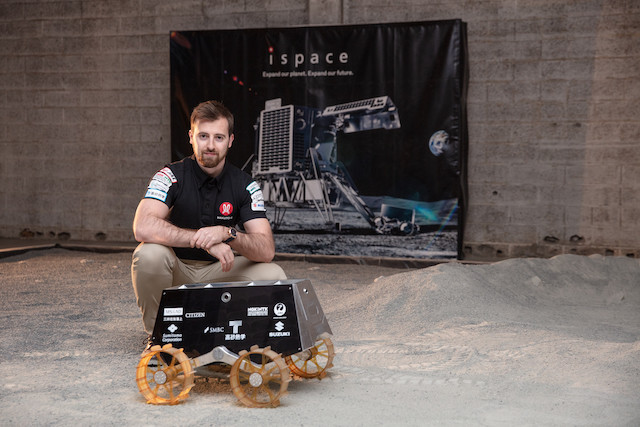In 2023, a rover developed by ispace Luxembourg will land on the moon to collect moon dust, or regolith for research as part of Nasa mission. Italian Luxembourger Federico Giusto, 26, is counting down the days until that moment because as a systems engineer for iSpace, the rover is his baby. “I’ll probably never get to touch the rocks,” he laughs, “but it’s the vision of knowing there’s something I built or designed up there.”
Giusto is part of Luxembourg’s growing new space eco-system, which was cemented with the creation of the Space Resources Initiative in 2016 and the Luxembourg Space Agency, two years later. According to the Luxembourg Space Agency, in 2020 there were 60 companies and laboratories active in new space activities in Luxembourg, employing 840 people.
A rare local hire
Giusto says he was set on a career in aerospace since he was a kid, problem solving with Lego. He studied at the International School of Luxembourg before completing a Master’s at Loughborough University, in the UK, and honing his skills and know-how through work placements, among others at SES.
Giusto had always expected he’d have to live and work abroad, such as the US or Netherlands and France, to pursue a career in aerospace. He was pleasantly surprised to see more roles emerging in his home country. “The Lux Space Agency and the government is doing a phenomenal job because as a young employee within this ecosystem that there's a lot to do,” he says.
In 2019, he joined ispace, a lunar robotics firm founded in Japan which last year was awarded a contract to collect up to 500g of regolith for Nasa. The contract, worth $5,000, will enable the firm to prove its technology works in lunar conditions, and could form the foundation of future lunar resource mining. Giusto is a rare local hire within his team. “There is a lot of a lot of talent from outside Luxembourg itself that was drawn into not because of this because of the very fast development that we've had in the last couple of years,” he says.

Luxembourg's Space Resources Initiative was founded on the idea that ice and other materials from asteroids or the Moon could be harnessed for both biological and energy needs in outer space. Photo: Shutterstock
"Very fortuitous"
Alexander Finch is another local hire helping drive space exploration from Luxembourg. He joined space technology firm Deep Space Industries five years ago, where he works as lead avionics engineer. Prior to that, he spent the first five years of his working career abroad, “never expecting a Luxembourg opportunity that would excite me to arise. And then, just when I was looking for my next role in 2016, the Luxembourg interest in space resources was announced”, he said, adding: “This was very fortuitous as I was starting to miss Luxembourg and loved that there'd be opportunities to come back.”
Alex knows from experience how hard it is to recruit local talent as he is responsible for hiring for DSI. He says: “I've had exactly zero local applicants from Luxembourgers, which is not ideal. One of the problems is that we're looking for people with a little experience and, bar a few people at LuxSpace or SES, there aren't many people from Luxembourg in this sector--at least not yet.”
STEM graduates
According to higher education ministry figures, STEM subjects remained popular among resident and non-resident students receiving student finance in 2018-2019. That year, some 2,696 students read engineering, 2,654 studying natural sciences, 1,277 in IT and 500 studied mathematics. Finch, who studied outside of Luxembourg, says a broad engineering background is best for the sector--and he points out that the University of Luxembourg's specialised programmes can be too focused in this respect. Meanwhile, the university has created an interdisciplinary space master’s, and Luxembourg is hosting the European Space Resources Innovation Centre.
Giusto, who mentors other young people interested in the sector, adds that more could be done to raise awareness and inspire locals to join the eco-system “at an earlier level. Not just networking with professionals that are already working with this industry. But when you're young and you're unsure what you want to do.”
